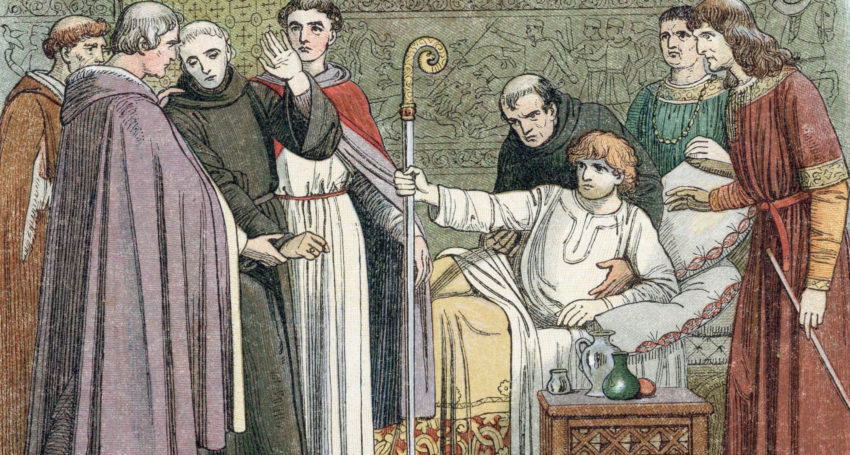Anselm of Canterbury
Features
“Anselm of Canterbury was the most significant Christian theologian between Augustine of Hippo and Thomas Aquinas and is regarded as the founder of scholastic theology,” says The Rev’d Canon Dr Marian Free on St Anselm of Canterbury whose Feast Day is marked on 21 April

Story Timeline
Saints and martyrs
- ‘Utterly orthodox and utterly radical’
- St Cuthbert – opening the door to the heart of heaven
- The man who would be king
- The saint and the sultan
- Dietrich Bonhoeffer: faith as unsovereign attention
- A maverick medieval mystic for modern times
- The life and legacy of Mary Sumner
- Mary, Mother of Our Lord
- Anglican Church remembers missionaries on New Guinea Martyrs Day
- Julian of Norwich: ‘all shall be well’
- Ugandan Anglican Martyr, Archbishop Janani Luwum
- Meet a saint for our times – Evelyn Underhill
- Benedict of Nursia
- Lady Eliza Darling – pioneering social reformer and evangelical Anglican
- Hildegard of Bingen
The Middle Ages were a time of great spiritual renewal. Many of our favourite saints and spiritual writers emerged at this time – think of Francis of Assisi, Julian of Norwich, and Hildegard of Bingen, the author of The Cloud of Unknowing, to mention just a few. Pilgrimages to holy sites became very popular at this time (it was in this climate that Chaucer’s Canterbury Tales was written).
During the Dark Ages, the Church focussed on judgement and hell. God was depicted as a distant, harsh and exacting being. In part as a reaction to this image of God, there developed in the Middle Ages an idea of Jesus as Mother. Feminine characteristics of love, understanding and compassion were found to be lacking in God, but present in Jesus. There are many examples of this use. In chapter 58 of Showings, Julian says, “the high might of the Trinity is our Father, and the deep wisdom of the Trinity is our Mother, and the great love of the Trinity is our Lord. Furthermore, I saw that the second person, who is our Mother, substantially the same beloved person, has now become our mother sensually.”
Advertisement
It was in this milieu that Anselm exercised his ministry.
Anselm of Canterbury was the most significant Christian theologian between Augustine of Hippo and Thomas Aquinas and is regarded as the founder of scholastic theology. He had a significant impact on theological thought, and associated metaphysics, ethics and the philosophy of language. He wrote several significant works, one of which examined the question ‘Why did God become man?’ (sic). In Cur Deus Homo (Why a God Man?) he introduced the Doctrine of Atonement – the notion that humanity’s sinfulness required a payment or sacrifice which was satisfied by Jesus’ death. Anselm’s treatise on atonement was later developed by John Calvin and subsequently embraced by Reformed and evangelical churches.
A second book Proslogium (or Discourse on the Existence of God) argued that Reason required that men (sic) should believe in God. Anselm is best known in modern times for his ‘Ontological Argument’, designed to prove God’s existence.
In Monologium (Monologue), Anselm suggests that the existence of God can be argued by the existence of degrees of perfection, suggesting that ultimate perfection must be God.
Anselm was born in Aosta, Italy in about 1033. In 1060 he joined the Order of St Benedictine in Caen becoming the abbot after only three years. Fifteen years later he became the abbot of Bec which, under his leadership, became a centre of learning.
Advertisement
His relationship with England was complex as was the relationship between France and England. William the Conqueror, who was a benefactor of the monastery, had given lands in both countries to the Benedictines and Anselm made three visits to view these lands. William’s son invited Anselm to be Archbishop of Canterbury, but the relationship was fraught with difficulty and Anselm left England only to be called back by William II’s successor, Henry I. A dispute with this king over ecclesiastical appointments saw him exiled for three years. In 1107 a compromise was reached that saw Anselm return to Canterbury, where he died two years later.
Anselm wrote theological tomes, as well as prayers and meditations, one of which can be found in the alternative canticles for Daily Prayer:
‘A Song of Anselm’
1 Jesus, like a mother you gather your people to you;
you are gentle with us as a mother with her children.
2 Often you weep over our sins and our pride,
tenderly you draw us from hatred and judgement.
3 You comfort us in sorrow and bind up our wounds,
in sickness you nurse us, and with pure milk you feed us.
4 Jesus, by your dying we are born to new life;
by your anguish and labour we come forth in joy.
5 Despair turns to hope through your sweet goodness;
through your gentleness we find comfort in fear.
6 Your warmth gives life to the dead,
your touch makes sinners righteous.
7 Lord Jesus, in your mercy heal us;
in your love and tenderness remake us.
8 In your compassion bring grace and forgiveness,
for the beauty of heaven may your love prepare us.





